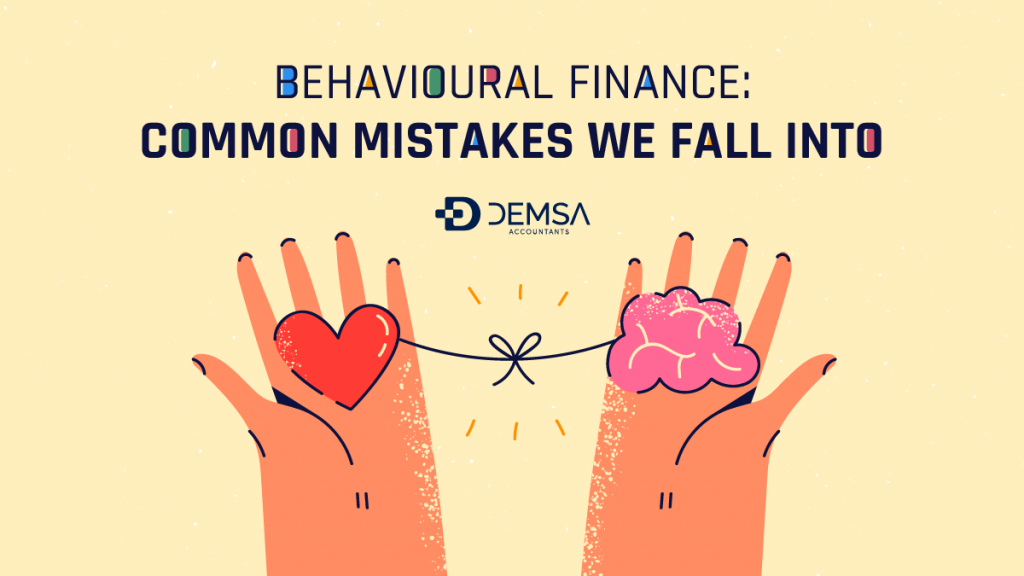Imagine the moments you feel on top of the world and courageously delve into new enterprises. Conversely, in moments of financial instability, feeling low may lead you to preserve your resources. As these two opposing ends of financial decisions are clear, there is much more to behavioural finance.
No matter how informed and prepared we are, our decision-making processes are not always rational. Behavioural finance can be explained as the sum of influences that determine our financial judgments and often include biases. In this blog, we are going to investigate common examples of decision-making biases in behavioural finance so that you can develop your own tactics to avoid them.

Biases in Financial Decision-Making
- Anchoring Bias: Relying on the First Piece of Information
Anchoring bias involves relying on the first information encountered to determine the future of our decision-making process. For example, you receive an offer X, which is above the industry standard. Later, you receive a second offer, Y, from another provider, which also happens to be above the standard. In deciding between X and Y, you are more likely to choose Y, claiming it is more affordable.
Because you relied on the first piece of information, your perception of a good deal was shaped by it, leading to anchoring bias. - Confirmation Bias: Seeking Only What We Want to See
Who doesn’t enjoy being proven right? But when it comes to finances, we must be cautious in our assumptions. Confirmation bias is our tendency to seek evidence that aligns with our preconceived notions while ignoring conflicting views. Especially when analysing data and markets, we might draw conclusions that support our previous judgments, blinding us to more objective viewpoints.
Incorporate the views you wouldn’t normally consider, or actively seek them out. There is nothing wrong with forming false opinions, as long as you are open to revising them. - Self-Attribution Bias: Taking Too Much Credit
Following confirmation bias, self-attribution bias also results from a lack of objective perspective. Our gains and losses are not solely our own doing, but rather the result of a vast array of influences. Politics, regulations, market conditions, and trends often play a role in outcomes without us even realising it. Be mindful of external factors and avoid assuming that you alone caused a specific outcome. Adopt a balanced perspective that accounts for both external factors and your actions. - Loss Aversion: Fear of Losing Over Trying to Win
No victory or loss lasts forever. Unfortunately, when we lose money due to financial decisions, we may forget this. In finance, our tendency to grieve over losses is often stronger than our joy for gains. This causes loss aversion, making us preserve our assets rather than seeking new opportunities to grow them. Essentially, we avoid losing so much that we don’t attempt to gain at all. - Mental Accounting: Separating Money Into Categories
Mental accounting involves adopting subjective criteria when it comes to earnings. For example, you may be frugal with your regular income but prone to splurging when you receive a bonus, deeming it as extra earnings. In such cases, your perception of money (and where it came from) drives your decisions rather than a thorough assessment of your capital and opportunities.
Emotions in Behavioural Finance
Fear, regret, and overconfidence can all impact your decisions. When these emotions arise, it’s important to embrace the philosophy of “less is more.”
While fear can lead you to make more careful decisions, excessive fear may prevent you from starting new ventures. Similarly, being too generous can leave you empty-handed, while greed can harm your reputation.
Fear can also turn into regret due to poor decision outcomes. Regret can trap you in a state of inaction. If your financial decision led to a loss, learn from it. Rather than closing off new opportunities, analyse where you went wrong and make more informed decisions in the future.
Handling negative emotions is difficult, but recognising the damaging effects of positive emotions can be even harder. Overconfidence in your financial strategies can lead to disappointment in the long run and cause you to misinterpret the financial environment you’re engaging in.
What Can Be Done?
Try adopting a dual role, acting as both your own advocate and adversary. Every thought process, emotion, and decision must be challenged by its opposite to create a more coherent picture. Observe your decision-making, become aware of biases, and master behavioural finance.

